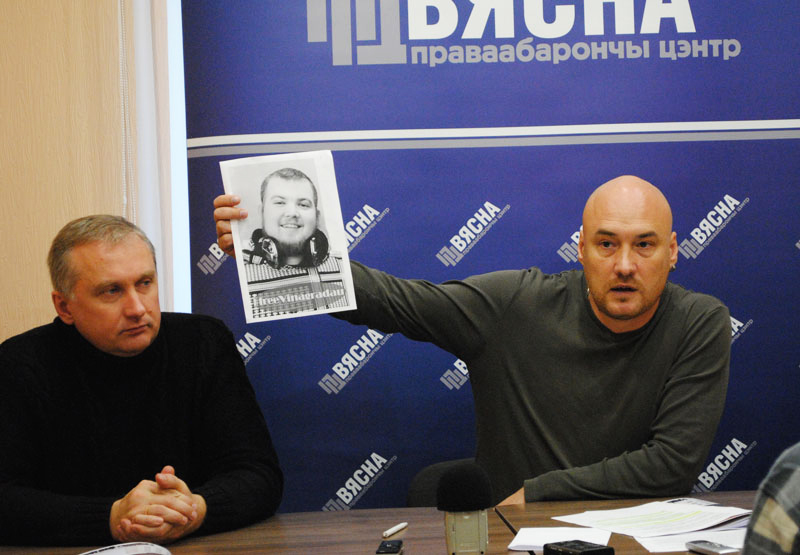Human rights defenders about the preventive detention: This is used arbitrarily - in order to fulfill the political order
Human Rights Center "Viasna" held on October 15 a press conference devoted to the various aspects of the preventive arrests in Belarus, where were presented the corresponding flaws in the legislation, the typical abuse of law by the police and new trends in this problem.
Human rights defenders are working with this problem more than for a year, and it became the subject of research, the results of which were presented to journalists. Report "Arbitrary preventive detention of activists in Belarus" - work of the mission of the International Federation for Human Rights (FIDH) and the Human Rights Center "Viasna", which was held in Belarus after the Ice Hockey World Championships in June this year. Attention of the mission was focused on of so-called preventive arrests, which is defined as the arbitrary detention of citizens, without legal grounds, on the eve of important political or social events in order to isolate the activists to prevent their participation in public street actions, relations with international delegations or press and other kinds of political and civic engagement.
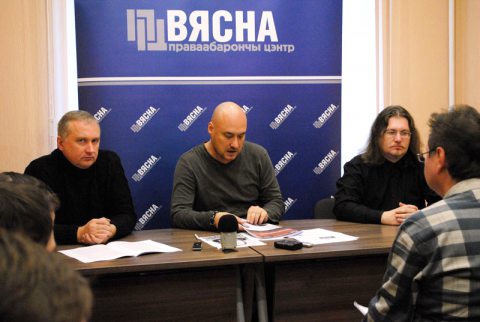
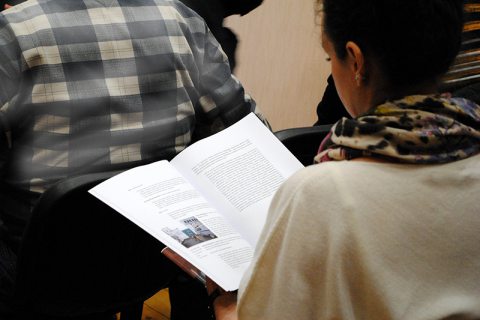
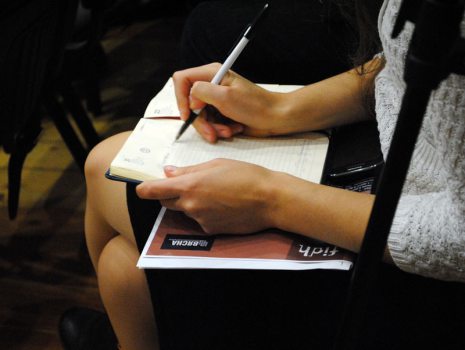
In presenting the report, the deputy head of the Human Rights Center "Viasna" Valiantsin Stefanovich reminded that the history of the problem of arbitrary preventive arrests of opposition activists is running from 2006. "It was in 2006, on the eve of the presidential election, the government has made considerable use of arbitrary preventive arrests, mainly of the activists of the election headquarters of presidential candidates Milinkevich and Kazulin. And on 19 March 2006, a few days before the election, according to our information, 236 people have been subjected to arbitrary preventive detention. Basically, they were accused by the article "Disorderly conduct" for "using obscene language in a public place. All subsequent years arbitrary preventive detention are actively used by the authorities and has acquired a systemic and systematic character. In 2012, human rights activists appealed to the Procurator General and the Head of the Supreme Court of Justice to discuss the problem. We have made a list of always the same people who constantly "swear" and somehow exactly before the official visits of foreign guests, and in 2012 it was Medvedev and Putin, who came to Belarus. Unfortunately, the General Prosecutor's Office and the Supreme Court refused to meet with us then, referring to the formal grounds that we are not entitled to appeal against the court ruling,"- said a human rights defender.
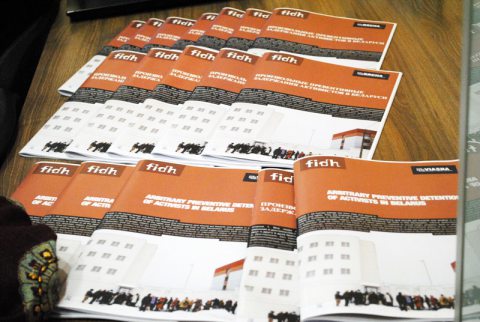
One of the latest examples of the use of arbitrary preventive arrests human rights activists called the Ice Hockey World Championship, which was held in May in Minsk. "Thus, now arbitrary preventive detention can be described like a kind of the political persecution, along with the political criminal prosecution, and are used by the authorities to prosecute activists because of their affiliation to the different political groups and the implementation of their peaceful political activities "- summed Stefanovich.
A lawyer and an expert in penitentiary system Pavel Sapelka as one of the co-authors of the report said about the legal aspect of the research problem. On the illegality of preventive detention itself, he noted that the law clearly defined cases when a person may be detained without violation - this applies to people of no fixed abode, who are detained for identification, and people with mental illness, who are detained for transmission to the hospitals. "In this case no" suspicion "can be taken into account. It's illegal to detain people on suspicion or assumption of committing an administrative violation,"- said the lawyer.
During the research human rights activists found that the legislation doesn’t provide sufficient guarantees that could protect the citizen from arbitrary detention or facilitate the appeal of the decision of the administrative liability for unjustified detention.
"From the surveys of those who served illegal administrative arrests, we know that in the appeal people are faced with unmanageable problems. Person sentenced to administrative arrest, is placed into the detention center. Assumed that there he should write a complaint against the decision of the administrative case which didn’t come into force. You can do it somehow. But then start absolutely unmanageable problems. When submitting this complaint you should pay the stamp duty. But if a parson has no one with whom he can contact and who can pay this stamp duty for him, his complaint won’t be considered. That’s why we recommend the legislator as a first step at least establish the demand of the complainant to stamp duty only if the complaint is not satisfied - this step doesn’t requires any radical revision of the legislation, "- said Pavel Sapelka.
Among the obstacles that require the amendment of the legislation, the expert also mentioned practices such as adjudication of guilt of a person only on the testimony of the police officers even if it’s possible to bring other witnesses. Also there are frequent cases when activists are detained without any grounds, and later charged with disobeying a lawful order of police officers, for example, to go to the police station. And here raises the question for what reason the person was detain what violation he has committed that the order of the police officers became lawful? In general, human rights activists insist that, in the administrative cases, when the penalties can be imposed by administrative detention or deportation, the same level of protection as in criminal cases should be given for the defendant that is, ensuring the right to use lawyer and the right to appeal. "Today we unfortunately have to admit that the law, which must be set to protect the rights and interests of citizens, is used arbitrarily by the police, in order to fulfill a certain political order, whose obviously illegal order," - said Sapelka.
Human rights defenders also said about the new problem: a wave of bringing activists to responsibility with the aggravating factors - the state of alcohol intoxication, in which they allegedly were during the detention. With respect to this kind of abuse of law by the police, human rights defenders advise to demand the examination in a civil institution in order to have the data for the appeal.
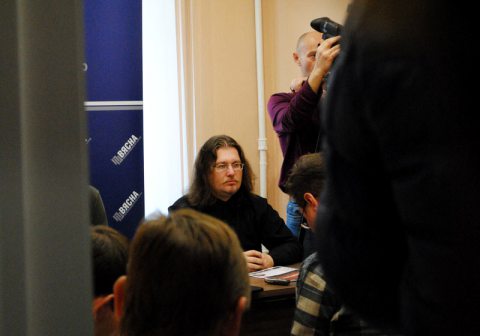
Guest of the press conference - the coordinator of the campaign "European Belarus" Maxim Viniarski shared his own experiences with journalists. This year he is one of the "champions" for the total period of preventive arrests - 57 days (according to the Human Rights Center "Viasna").
Most of the people known for their civic engagement, today actually lost the opportunity to live at the place of their registration. So says the activist, who personally has this problem after 2006. Maxim Viniarski described as usually looks scheme of preventive detention.
"When I lived at home, all the time before any event the representatives of the police department started to visit me, asked my mother to tell where they can find me, they said "we are doing just talk with him.” She knew how could end my conversations with the police, so they would most likely have heard that "he is not here", "he doesn’t live here" ... When you are leaving the place you live (and they know where you are living) a few people are coming to you, usually dressed in civilian clothes. It's either Special Police Force or drug enforcement, or criminal investigation. I remember before the election, when I was an election agent of candidate Sannikau it was the department for combating organized crime. Most often, they even quickly show you a document. And then ask you to show your documents. If you have no documents, say that they need to clarify your identity. If you have one, they take it and say that you have to go with them. Then it all depends on how there are many of them. If there are two –they will persuade you to go with them. If there are three or four people, and there are no journalists nearby, everything happens easier: they wring your hands back, drag into a car and take to the police department. And since you are arrested, you are almost completely excluded from the legal field. Your rights don’t bother anybody. It’s easy to write in guidelines what rights do you have in the police department, but to exercise these rights is virtually impossible. For example, knowing my stern stance, they don’t even give me to sign anything. From the moment when it became clear that I’m finally brought to the department, they often don’t pay any attention until they finish registering their papers.” Activist also described how the police even don’t want to explain the reasons for detention, correct articles to more “convenient” and the place of detention to that where there were no witnesses in the protocols, ignore asking for witnesses as well as for lawyer, and requests to inform relatives or friends about the detention. According to the activist, often he learns the circumstances of his case only directly from the judge during the trial.
The participants of the press conference gave examples, which in the light of the problem of preventive detention clearly confirm the dependence of the judiciary and selectivity of justice. Valiantsin Stefanovich reminded resonance cases, when the problem of arbitrary detention flows out of the plane of the administrative prosecution in a criminal one. Some of this cases were initiated on the eve of the 2010 presidential election against the activists of the "Young Front" Zmitser Dashkevich and Eduard Lobau, who were declared by the human rights defenders be political prisoners. And there is one more – current case of activist Yuri Rubtsou form Homel, whose sentence has not yet entered into force.
"Rubtsou was detained at an allowed by the authorities meeting only for the inscription on his t-shirt "Lukashenko, go away!" he was brought half-naked to the court; in a way that offends human dignity, but the judge, of course, wasn’t interested in why the man is was looking like this. Despite the fact that the judge has to protect the rights and interests of citizens. And now it turns out that those who testified that he used obscene language testify that he insulted the judge. That’s why we declare that, if after appeal the decision in the same form comes into force and Rubtsou serve year and a half of imprisonment, we will declare him to be political prisoner. Because sentencing of Rubtsou is directly related to the peaceful exercise of his rights to freedom of peaceful assembly and freedom of expression. Every citizen of the Republic of Belarus has the right to say "Lukashenko, go away!" And nobody has the right to detain citizens for it "- recalled the position of human rights defenders Stefanovich.
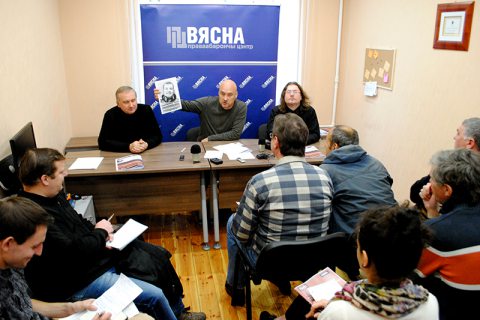
Separately, deputy head of the "Viasna" focused on the situation with the activist of youth organization "Zmena" Pavel Vinahradau. "Pavel was on October 6 in our office and warned us that the 9th is going for checking to the police department, because he is under the preventive surveillance. And we were just discussing the situation that happened to him and what can be blamed for the use of alcohol and that he most probably will be delayed, because that on October 10, as you know, began the summit of the CIS and Putin visited Minsk. Literally everything we talked to Pavel, took place on 9 October,"- he said.
During the press conference was announced a statement of the International Federation for Human Rights (FIDH) and the Human Rights Center "Viasna" calling for ending of persecution of Pavel Vinahradau. Human rights activists have announced a campaign on social networks for the liberation of civil activist who, inclusive of the current arrest, has been sentenced to 65 days in prison this year as a result of arbitrary preventive detention.



